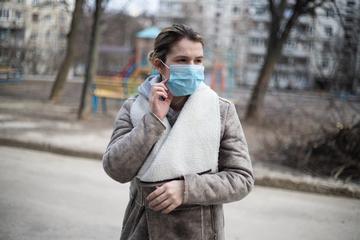Climate Crisis Thinking in the time of COVID-19
Covid-19 is playing out in a very distinctive set of political, cultural and economic circumstances. It is spreading through a global population already in the grip of acute anxiety. It speaks to, and amplifies, a host of fears that already ran uneasily through public and private conversations about the future.
In the last few years, climate breakdown and multiple environmental threats have become too intrusive to be denied or ignored. Surveys of opinion showed that, at last, the issue is among the top concerns of populations around the planet. Many people in the world are already living in the unstable future of which scientists and environmentalists have been warning for decades. Public discourse, even in wealthy nations, is increasingly shaped by voices of foreboding. High-profile movements of mass civil disobedience warning of human extinction; castigation of political leaders by striking school children; declarations of climate emergency at every level of government: all these are fuelling a wide cultural recourse to dystopian visions of what is to come.
Even so, there has been a collective failure of imagination and political will. How do melting icebergs and burning rainforests translate into the fine grain of an ordinary life and ordinary concerns of someone living in a land of well-stocked supermarkets? ‘Make sure you recycle’, people were told. ‘What really matters, though, is to get Brexit done; to make America great.’
And then came the coronavirus pandemic.
Every aspect of daily life has been affected by the response to it. Expectations of the future have been profoundly destabilised. People have been plunged into terrifying insecurity. They have been stripped overnight of their luxurious confidence in the persistence of the ordinary – the confidence that muted and muffled climate anxiety, even if it couldn’t banish it.
Coronavirus thinking…

Some see pandemic as an opportunity for the transformative change that we desperately need. In the time of Covid-19, they say, expertise is back. It has become clear to everyone which work and which workers really matter. The social injustices on which our societies are built have been brutally exposed. People are finally seeing the consequences of fragile profit-driven supply chains, chronic underfunding of health services, and the threadbare social security net. Carbon emissions and air pollution levels have dropped significantly – for now. The responses of national governments have shown us that abrupt, radical societal transformation was possible all along. People locked down in their homes have an unprecedented chance to stop and reflect on what matters to them. When the virus is beaten back, there may be a chance to make a better world out of ruined economies.
We must hope that all this is true. But bleaker analyses abound. It is always hard to recover civil liberties after the imposition of authoritarian ‘emergency measures’, especially when these measures tap into public enthusiasm for politicians presenting themselves in nationalist language, and as ‘strong leaders’. There are serious risks in allowing governments to normalise the use of bio-surveillance tools in order to monitor the spread of Covid-19. It will never be easy to argue that the threat of pandemic is definitively ended, especially if the coronavirus becomes endemic without an effective vaccine. More broadly, the potential for sharp escalation of the on-going project of disaster capitalism – ‘coronavirus capitalism’ – is very evident. The virus is already being ruthlessly deployed as a pretext to intensify existing geopolitical and domestic conflicts.
Perhaps the gravest danger among all these is the fact that most people will understandably want to prioritise economic recovery, seeing it as the best way to return to normality. There may be even less appetite for fundamental societal change to mitigate the effects of climate and ecological crises. The idea that climate action can wait is deeply engrained. It was signalled strongly by the decision to postpone the COP26 climate talks. After declaring last month that 2020 is ‘a pivotal year for how we address climate change… We are in an unfolding climate emergency’, the UN Secretary-General now endorses delaying until 2021 because Covid-19 is ‘our foremost priority’.
... in a time of climate crisis
In the west, we are just a few weeks into pandemic lockdown, and yet, there has been a daily deluge of far-reaching commentary and analysis. All the ideas that I’ve just outlined were in play within days. The fact is that despite the profound dislocation and strangeness that we all feel, there is an eerie familiarity to the contours of the thinking around Covid-19.

This is because it is based on existing climate crisis thinking. It takes decades of climate-related discussions about dangers, opportunities, possible scenarios, and much else, and hangs them on the more focused issue of the pandemic.
This transfer of ideas is possible because, like climate crisis, coronavirus and consequences for the human population are products of the imperatives, priorities, fragilities and injustices of our economic and political systems. It is the product of the destruction of planetary ecosystems that these systems cause. As with climate science, governments, corporations, media and many voters disregarded expert opinion around the risks of pandemic and the consequences of running health and social services into the ground. Covid-19 has the same human causes as climate crisis.
But drawing on climate crisis thinking to discuss this pandemic is also, I would suggest, an intuitive response because what we are experiencing now is the west’s first real taste of the ominous future that we, in wealthy nations, have made.
This pandemic is climate crisis. This is what it looks and feels like.
Few of us will find ourselves sliding into the Arctic Ocean in a cascade of collapsing ice. In the west, if we are spared sudden catastrophe by a domino effect of multiple tipping points, we are more likely to find our lives increasingly punctuated by a mounting series of interruptions, shortages, and unsettling alterations. Like this crisis, they will be handled by increased authoritarianism in place of the preparation that could have prevented or mitigated them. They will be experienced in our local shops, our neighbourhoods, workplaces and schools, and in the bright sunlight and rain-saturated earth of an English spring. Most of us will not know climate change through scientific studies, but through life.
The question that we now need to consider is this. If climate crisis has given particular contours to our experience of Covid-19, what contours can Covid-19 give to our climate crisis thinking?
This post is the first in a series of posts sponsored by the Climate Crisis Thinking network. We aim to explore these and other questions from different disciplinary and interdisciplinary perspectives.
If you would like to contribute to this blog, please contact Amanda Power [amanda.power@stcatz.ox.ac.uk].
*****
About the ‘Climate Crisis Thinking in a time of Covid-19’ blog
The ‘Climate Crisis Thinking’ network aims to bring the expertise, knowledge, imagination and values of Humanities and Social Sciences into responses to climate change. It also uses the climate crisis as a provocation to radical new thinking within these disciplines. Both elements enable more effective engagement with the urgent issues of our times, and the capacity to educate in ways that will better equip students in all disciplines to face the challenges of the future.
Since our launch last year, we have found that these aims resonate widely in our various disciplines and beyond. Global warming has been treated all along as a ‘scientific’ problem, to be studied and solved in the sciences. And so it is being – but unfortunately, there and nowhere else. Scientific findings have not achieved sufficient traction in the ‘real worlds’ of relentless economic growth and ecological destruction fuelled by political failure and public indifference.
Climate crisis is the product of human activity, human values and culture, human histories, and intricate human systems of power and inequality. It will be experienced by humans within their lives and localities, through the lives of the people, animals, plants and places that they love, and conscious or unconscious entanglements of all planetary life. It was never going to be possible to understand and tackle it without the expertise of the humanities, arts and social sciences.
This has been brought dramatically into focus by the coronavirus pandemic. While the sciences have been essential to formulating and delivering responses and to shaping public understanding, it has been clear from the outset that this is an issue of humans. It is about our lives and wellbeing; our connections: familial, local, global, and interspecies; the histories that have created our present; our ways of thinking and acting; our political systems; the grotesque injustices and inequalities that we have normalised and accepted; our relationships to the complex ecosystems we inhabit.
It is crucial that during this period of intense focus on Covid-19, that pandemic or the intensifying climate crisis within which it sits, are not framed away from the expertise of Humanities and Social Sciences disciplines.
Climate Crisis Thinking in the Humanities and Social Sciences, TORCH Networks



